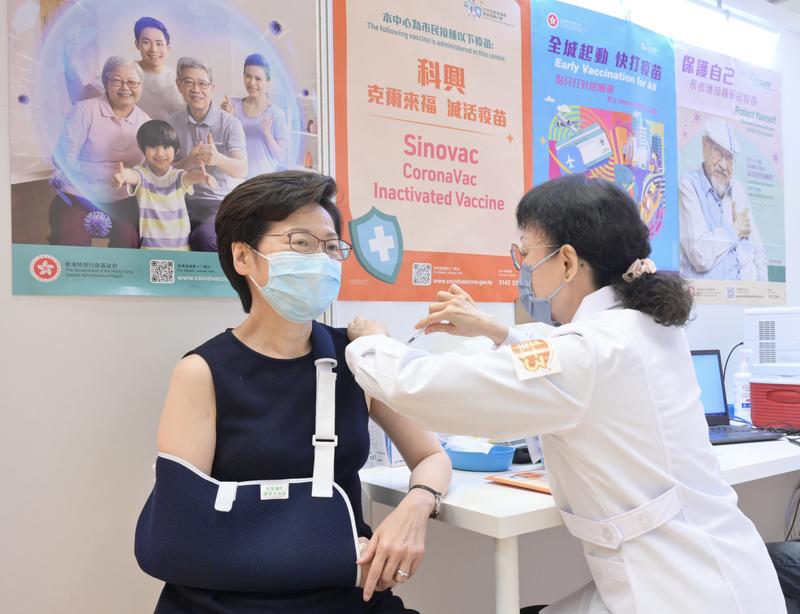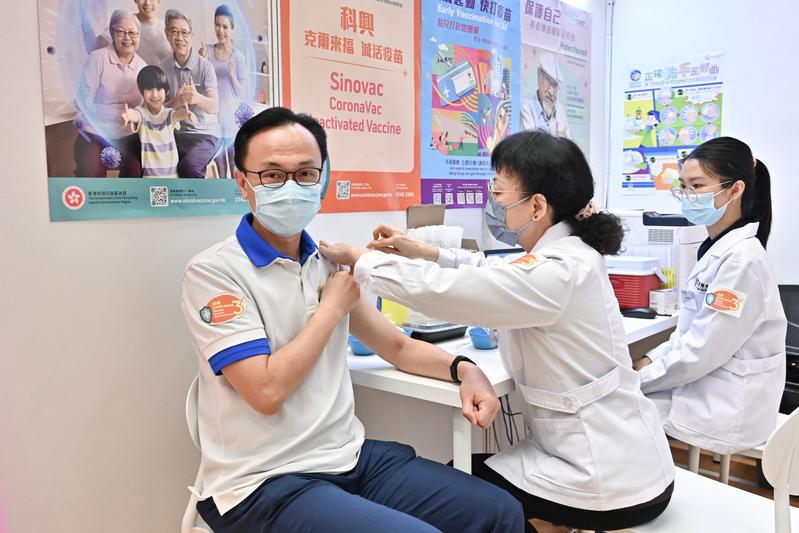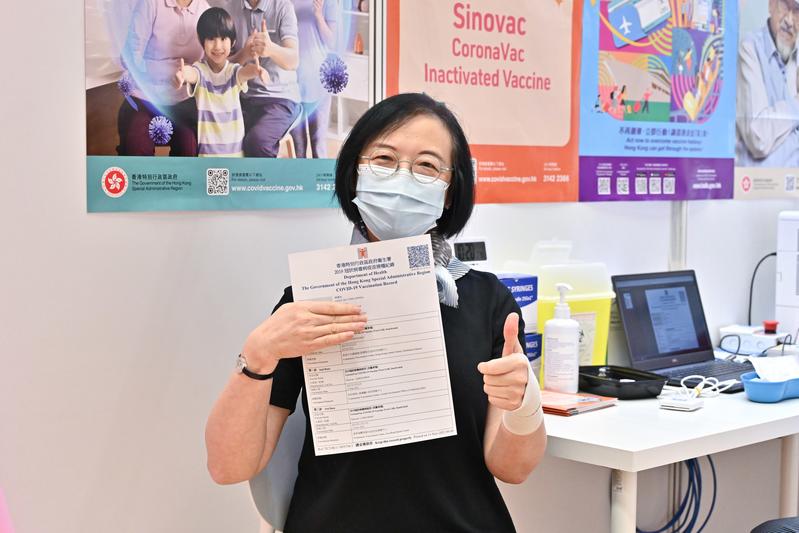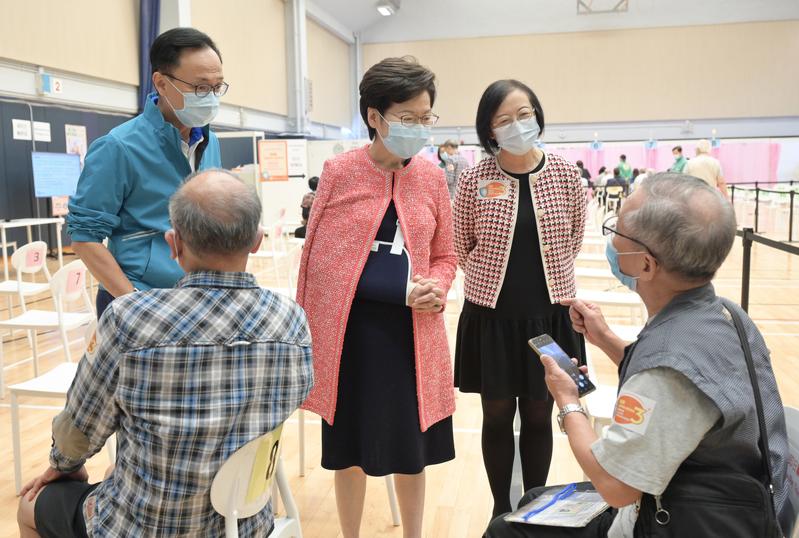 Hong Kong Chief Executive Carrie Lam Cheng Yuet-ngor (left) receives her third dose of the Sinovac vaccine at the Community Vaccination Centre at Java Road Sports Centre, North Point, Hong Kong, Nove11, 2021. (PHOTO / HKSAR GOVERNMENT)
Hong Kong Chief Executive Carrie Lam Cheng Yuet-ngor (left) receives her third dose of the Sinovac vaccine at the Community Vaccination Centre at Java Road Sports Centre, North Point, Hong Kong, Nove11, 2021. (PHOTO / HKSAR GOVERNMENT)
HONG KONG - Chief Executive Carrie Lam Cheng Yuet-ngor received her third jab of the Sinovac vaccine on Thursday morning as Hong Kong kicked off a plan to offer COVID-19 vaccine booster shots to the elderly and high-risk groups.
After receiving her third dose at a community vaccination center in North Point, Lam called on members of the public to get vaccinated as soon as possible as the pandemic situation remains severe around the world.
ALSLO READ: Infections of 3 air crew members among 5 new virus cases in HK
 Hong Kong Secretary for the Civil Service Patrick Nip Tak-kuen (left) receives his third dose of the Sinovac vaccine at the Community Vaccination Centre at Java Road Sports Centre, North Point, Hong Kong, Nov 11, 2021. (PHOTO / HKSAR GOVERNMENT)
Hong Kong Secretary for the Civil Service Patrick Nip Tak-kuen (left) receives his third dose of the Sinovac vaccine at the Community Vaccination Centre at Java Road Sports Centre, North Point, Hong Kong, Nov 11, 2021. (PHOTO / HKSAR GOVERNMENT)
"The more people get vaccinated, the greater the hope Hong Kong can emerge from the epidemic, and the sooner people can get back to their normal life, including the resumption of quarantine-free travel with the mainland," Lam said.
READ MORE: HK to give third jab to residents at high risk for COVID-19
Also getting a Sinovac booster dose at the center Thursday morning was Secretary for the Civil Service Patrick Nip Tak-kuen and Secretary for Food and Health Sophia Chan Siu-chee, who are responsible for coordinating the COVID-19 Vaccination Programme.
Nip told reporters at the center that he chose to receive the Sinovac dose as he preferred vaccines using the inactivated virus technology platform.
 Secretary for Food and Health Sophia Chan Siu-chee poses with a vaccination certificate after receiving her third dose of the Sinovac vaccine at the Community Vaccination Centre at Java Road Sports Centre, North Point, Hong Kong, Nov 11, 2021. (PHOTO / HKSAR GOVERNMENT)
Secretary for Food and Health Sophia Chan Siu-chee poses with a vaccination certificate after receiving her third dose of the Sinovac vaccine at the Community Vaccination Centre at Java Road Sports Centre, North Point, Hong Kong, Nov 11, 2021. (PHOTO / HKSAR GOVERNMENT)
The government announced last week to give a third COVID-19 dose to an estimated 1.86 million residents in prioritized groups on the recommendation of health experts.
The prioritized groups include those who are above the age of 60, healthcare workers, and those who work in cross-boundary transportation and border control points and ports.
 Hong Kong Chief Executive Carrie Lam Cheng Yuet-ngor (center), accompanied by Secretary for the Civil Service Patrick Nip Tak-kuen (back, left), and Secretary for Food and Health Sophia Chan Siu-chee (back, right), chats with members of the public who received vaccination at the Community Vaccination Centre at Java Road Sports Centre, North Point, Hong Kong, Nov 11, 2021. (PHOTO / HKSAR GOVERNMENT)
Hong Kong Chief Executive Carrie Lam Cheng Yuet-ngor (center), accompanied by Secretary for the Civil Service Patrick Nip Tak-kuen (back, left), and Secretary for Food and Health Sophia Chan Siu-chee (back, right), chats with members of the public who received vaccination at the Community Vaccination Centre at Java Road Sports Centre, North Point, Hong Kong, Nov 11, 2021. (PHOTO / HKSAR GOVERNMENT)
They will have to wait for six months after their second dose before they can take their third jab.
Another group includes immunocompromized people such as cancer patients, organ transplant patients, and late-stage HIV patients. They should get their third shot at least four weeks after their second jab.
To facilitate immunocompromized patients to receive the third dose earlier, the Hospital Authority will provide them with an identification document.
In a statement issued on Wednesday, a spokesman for the authority said that public hospital patients who belong to the specific groups of immunocompromised patients need to present the identification document issued by the hospitals in order to receive the third jab four weeks after and within six months from the second dose.
"Those who have received the second dose of vaccination over four weeks can go directly to the community vaccination centers or COVID-19 vaccination stations at public hospitals with the identification document to get the third jab, or make online bookings," the spokesman said.
For patients who have received the second dose for more than six months, they can take the third dose anytime under the category of people with chronic illnesses without the need of showing the identification document, the spokesman added.


